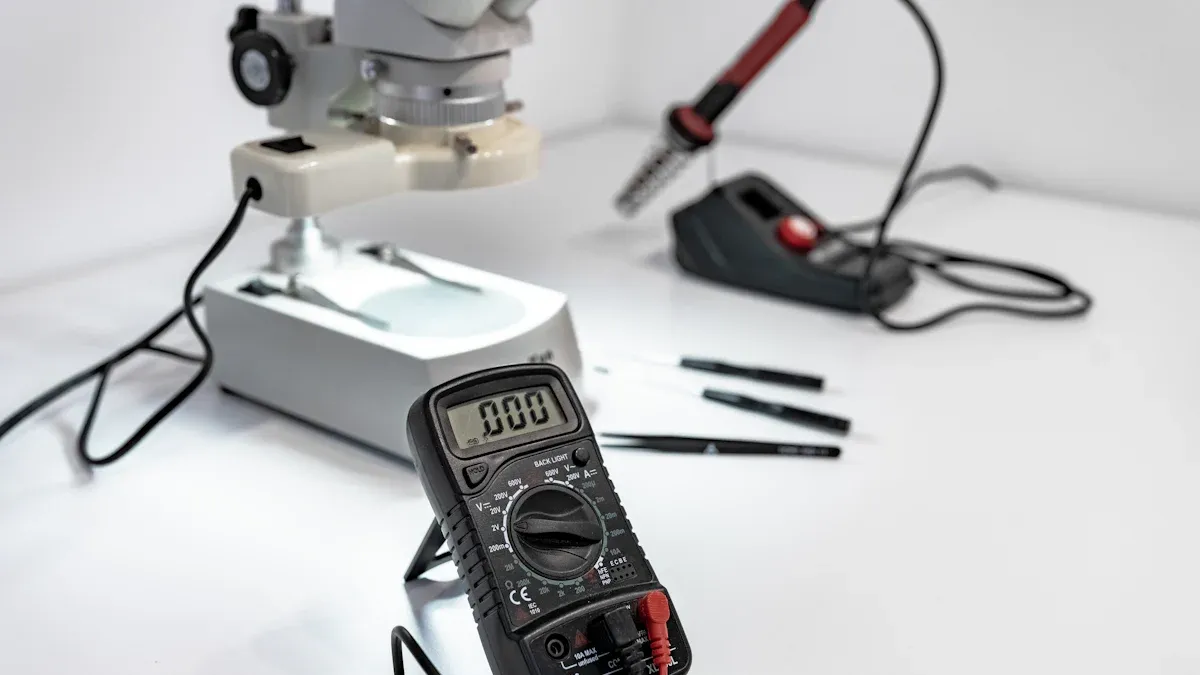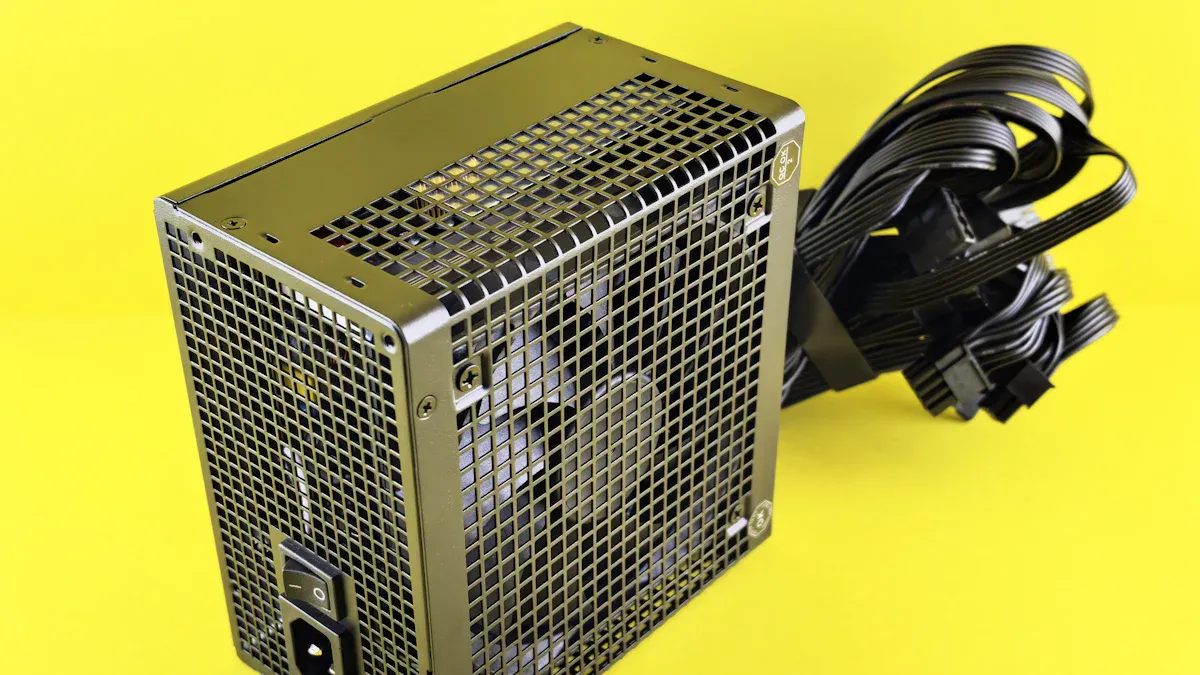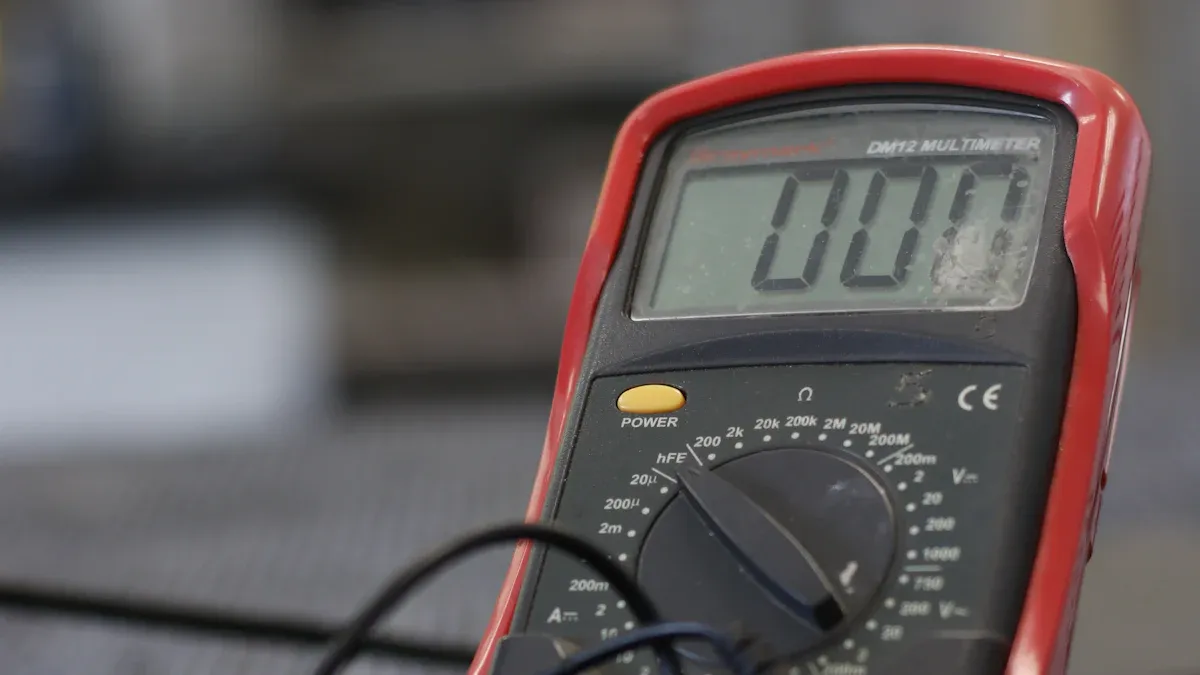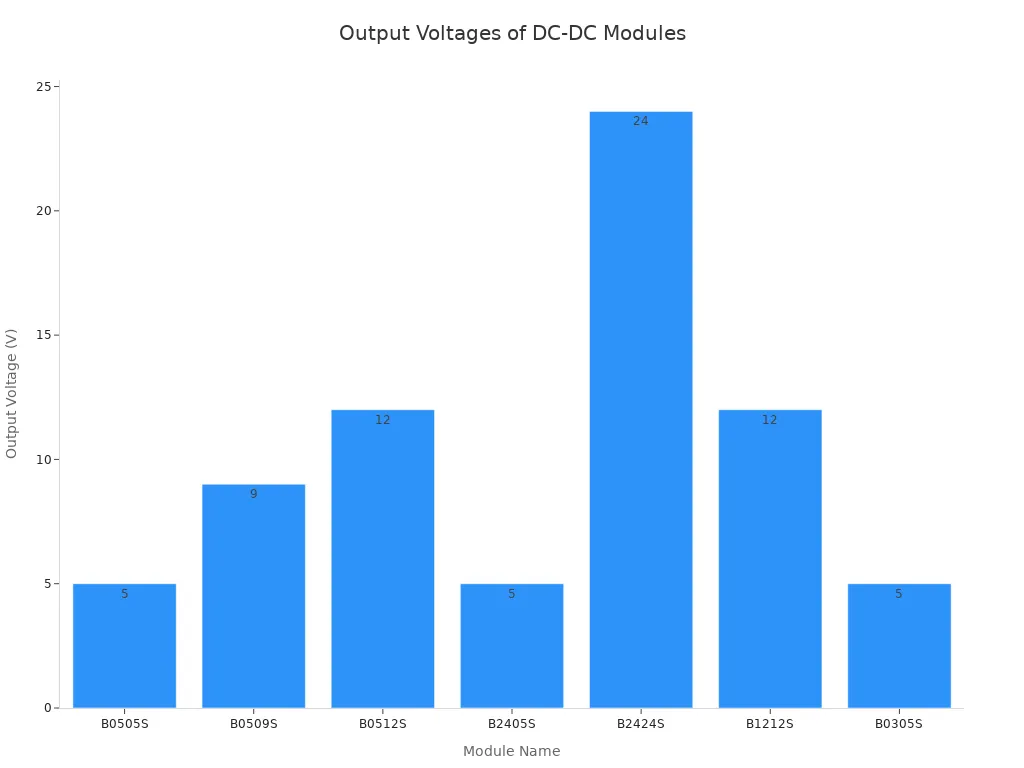B0505S-1W DC-DC Converter Review and Real-World Performance

The B0505S-1W DC-DC converter has built a strong reputation for reliability in practical projects. One user added the B0505S-1W to a microcontroller-based radio display to improve isolation and reduce interference. After moving from a prototype to a finished PCB, the radio receiver experienced no noise from serial data lines. This real-world result shows that the converter can deliver stable, interference-free performance in demanding environments.
Key Takeaways
The B0505S-1W offers reliable, stable power with strong galvanic isolation, protecting circuits from noise and ground loops.
It supports a wide input voltage range and works efficiently up to 86%, making it suitable for low-power, noise-sensitive applications.
The converter features automatic short circuit protection and operates well in harsh environments with temperatures from -40°C to +85°C.
Proper capacitor selection and placement near the converter pins reduce noise and improve performance significantly.
Designers should avoid overloading, ensure good cooling, and use proper PCB layout to maintain stable operation and extend device life.
B0505S-1W Overview

Features
The B0505S-1W stands out as a compact, isolated DC-DC converter designed for reliability and versatility. Engineers value its ability to deliver stable power in a small footprint. The device supports a wide input voltage range and maintains high efficiency, even under demanding conditions.
Specification | Value |
|---|---|
Input Voltage | |
Output Voltage | 5 V DC |
Rated Output Power | 1 W |
Output Current | |
Isolation Voltage | 1000 V DC |
Efficiency | Up to 86% |
Operating Temperature | -40°C to +105°C |
Maximum Capacitive Load | 220 µF |
Dimensions (L x W x H) | |
Package Type | SIP/DIP |
Short Circuit Protection | Yes, automatic recovery |
MTBF | ≥ 200 million hours |
This converter features high power density, robust isolation, and a sealed construction that resists moisture and vibration. Its RoHS compliance ensures it meets environmental safety standards. The automatic short circuit protection and wide temperature range make it suitable for harsh environments.
Tip: The compact size and international standard pin layout simplify integration into both new and existing designs.
Applications
Designers use the B0505S-1W in a variety of settings where isolation and reliability are critical. Typical applications include:
Isolated power supplies for analog and digital circuits
Industrial automation systems
Power supplies for IGBT drivers
Projects in environments with high humidity or vibration
Safety-critical systems requiring galvanic isolation
Hobbyist and professional electronics where noise immunity is essential
The B0505S-1W helps prevent ground loops and protects sensitive components from electrical noise. Its high isolation voltage and stable output make it a preferred choice in industrial, medical, and telecom applications.
Performance

Efficiency
Engineers often evaluate DC-DC converters by their efficiency. The B0505S-1W delivers moderate efficiency at full load, making it suitable for many low-power applications. Efficiency measures how much input power the converter turns into usable output power. Higher efficiency means less heat and lower energy costs.
The table below compares the efficiency of the original B0505S-1W with a newer revision and highlights design improvements:
Version | Efficiency at Full Load (100%) | Efficiency at Light Load (10%) | Notes on Design Improvements |
|---|---|---|---|
B0505S-1W R1 | ~70% | ~40% | Original Royer oscillator design, limited short circuit protection |
B0505S-1WR3 | >82% | >75% | Independent oscillator, improved short circuit protection, lower standby power |
The original B0505S-1W achieves about 70% efficiency at full load. At lighter loads, efficiency drops to around 40%. Newer models, like the R3 series, improve efficiency and add better protection features. These improvements help reduce wasted energy and make the converter more reliable in modern designs.
Note: For projects that require maximum energy savings, designers may prefer the R3 version or similar high-efficiency converters.
Ripple and Noise
Stable output voltage and low noise are important for sensitive electronics. The B0505S-1W maintains a low to moderate ripple noise level, which helps protect circuits from unwanted interference. Ripple refers to small voltage changes on the output, while noise can cause problems in audio, radio, or measurement systems.
The following table summarizes key performance specifications:
Parameter | Specification |
|---|---|
Input Voltage Range | 5V ±10% DC |
Output Voltage | 3.3V ±10% DC |
Linear Adjustment Rate | ±1.2% |
Load Regulation (10%-100%) | 15% |
Output Ripple Noise | ≤75mVp-p (Nominal), ≤100mVp-p (Max) |
Output Current | 0.2 to 0.3 A |
Max Capacitive Load | 220 µF |
The converter keeps ripple noise below 75mVp-p under normal conditions and up to 100mVp-p at maximum. This performance meets the needs of most analog and digital circuits. The linear adjustment rate of ±1.2% and load regulation of 15% show that the output remains stable, even as the load changes.
Engineers often choose this converter for projects where clean power is essential, such as sensor interfaces or communication modules.
Load Handling
The B0505S-1W supports output currents from 20 mA up to 200 mA. It handles changes in load without large drops or spikes in output voltage. The converter’s load regulation of 15% means that the output voltage stays within a safe range as the current increases from light to full load.
In real-world tests, users found that the converter performed reliably when powering microcontrollers, sensors, and small relays. The automatic short circuit protection adds another layer of safety, allowing the converter to recover quickly if a fault occurs.
The converter works best when the load stays within the recommended range.
Exceeding the maximum load can cause voltage drops or trigger protection features.
For applications with frequent load changes, the converter’s stable response helps prevent system resets or data errors.
For best results, designers should match the converter’s output range to the needs of their circuit.
Reliability
Durability
Engineers often choose the B0505S-1W for its strong durability in challenging environments. The converter features a sealed construction that protects internal components from moisture and dust. This design helps the device resist vibration and mechanical shock, which are common in industrial and automotive settings. Manufacturers use high-quality materials to ensure long-term stability and reduce the risk of failure.
The B0505S-1W operates reliably across a wide temperature range. Proper thermal management plays a key role in maintaining performance and extending lifespan. The following points highlight important aspects of its temperature tolerance:
The B0505S-1W works within a temperature range of -40°C to +85°C.
Keeping the converter within this range ensures optimal performance and longevity.
Extreme heat or cold can impair operation and damage electronic parts.
A cool, dry environment supports stable performance and a longer device life.
Tip: Install the converter in areas with good airflow and minimal exposure to moisture for best results.
The robust design and environmental sealing make this converter a dependable choice for both indoor and outdoor applications.
Isolation
Isolation stands as a key feature of the B0505S-1W. The converter provides 1000VDC galvanic isolation between input and output. This high level of isolation protects sensitive circuits from voltage spikes and electrical noise. It also prevents ground loops, which can cause data errors or equipment damage.
Galvanic isolation separates the input and output sides electrically. This separation improves safety for both users and connected devices. In industrial systems, isolation helps prevent interference from motors, relays, or other noisy equipment. Medical and telecom applications also benefit from this feature, as it reduces the risk of cross-talk and signal corruption.
Note: Proper isolation not only improves safety but also enhances the reliability of the entire system.
The B0505S-1W’s strong isolation and durable build make it a trusted solution for demanding projects where performance and protection matter most.
Usage Tips
Capacitor Selection
Selecting the right capacitors ensures the B0505S-1W delivers clean, stable power. Engineers often use a pi-filter on both the input and output sides to reduce noise and suppress electromagnetic interference (EMI). This filter improves performance in sensitive circuits.
Place a 47µF low ESR ceramic capacitor on the input side.
Add a 10µF low ESR ceramic capacitor on the output side.
Insert a 6.8µH inductor between the capacitors for extra filtering.
Position capacitors as close as possible to the converter pins.
Use short, direct ground connections to minimize resistance and inductance.
Tip: Low ESR ceramic capacitors help minimize ripple voltage and improve noise immunity. Proper placement and short traces make a significant difference in real-world performance.
This pi-filter configuration works well for most small DC-DC converters, including the B0505S-1W. While exact values may vary by application, these recommendations provide a solid starting point for most designs.
Common Pitfalls
Even experienced designers can make mistakes when integrating DC-DC converters. The following list highlights frequent issues and how to avoid them:
Overloading the Converter
Exceeding the 200mA maximum output current can cause voltage drops or trigger protection circuits. Always check the load requirements before finalizing the design.Insufficient Cooling
Placing the converter in a poorly ventilated area can lead to overheating. Ensure good airflow around the device, especially in high-temperature environments.Improper PCB Layout
Long traces or poor grounding increase noise and reduce efficiency. Keep traces short and use a solid ground plane for best results.Incorrect Capacitor Placement
Placing capacitors far from the converter reduces their effectiveness. Always position them close to the pins.
Avoiding these pitfalls helps maintain stable operation and extends the life of the B0505S-1W in any project.
Comparison
Alternatives
Engineers often compare isolated DC-DC converters like the B0505S-1W to non-isolated options. Each type offers unique advantages and drawbacks. The table below highlights key differences between these solutions:
Feature/Aspect | Isolated DC-DC Converters (e.g., B0505S-1W) | Non-Isolated Alternatives |
|---|---|---|
Cost | Very low cost (as low as $0.01 per unit) | |
Isolation | Provides galvanic isolation | No isolation |
Complexity | Higher (includes transformer) | Lower |
Footprint | 20–40% larger | Smaller |
Efficiency | Around 80% | 90–97% |
Application Suitability | Industrial, medical, consumer (with isolation) | Cost-sensitive, non-isolated applications |
Certifications | May lack high-end certifications | High-end options available at higher cost |
The B0505S-1W stands out for its compact 6-pin SMD package, which reduces PCB space by up to 30%. It delivers high-efficiency power for low-power electronics and supports automated assembly, saving production time. However, it has a slightly larger footprint and lower efficiency than non-isolated converters. Its cost remains competitive, especially in volume orders, with prices ranging from $0.83 to $0.89 per unit for bulk purchases.
For projects that require electrical isolation, isolated converters like the B0505S-1W offer a balance of safety, reliability, and affordability.
When to Use
Selecting the right converter depends on the application’s needs. The table below outlines scenarios where the B0505S-1W excels:
Feature | B0505S-1W DC-DC Converter Characteristics | Suitable Scenarios / Applications |
|---|---|---|
Power Output | Low-power circuits, minimal energy consumption | |
Output Voltage | 5V | Standard for industrial and commercial devices |
Efficiency | ~80% | General use where cost and performance matter |
Isolation | 1000VDC galvanic isolation | Safety, noise reduction, ground loop prevention |
Operating Temperature | -40°C to +85°C | Moderate to harsh environments |
Protection Features | Overvoltage, overcurrent, short circuit | Industrial and commercial reliability |
Size and Cost | Compact, cost-effective | Space- and budget-constrained designs |
Engineers choose the B0505S-1W for industrial control systems, medical devices, and sensitive analog circuits. It works best in environments where electrical isolation is critical for safety or noise reduction. The converter also fits well in applications with limited space and tight budgets. Projects that do not require isolation or demand higher efficiency may benefit from non-isolated alternatives.
When safety, reliability, and isolation matter most, the B0505S-1W remains a top choice for designers.
Engineers find this converter reliable for stable power, strong isolation, and robust durability. It fits well in industrial, medical, and hobbyist projects that need safety and noise reduction. For those exploring similar DC-DC modules, the table below lists practical alternatives. The chart shows output voltage options for easy comparison.
Module Name | Power Rating | Input Voltage | Output Voltage | Description |
|---|---|---|---|---|
B0505S | 1W | 5V | 5V | DC-DC Isolated Power Supply Module, similar to the query product |
B0509S | 1W | 5V | 9V | DC-DC Isolated Power Supply Module |
B0512S | 1W | 5V | 12V | DC-DC Isolated Power Supply Module |
B2405S | 1W | 24V | 5V | DC-DC Isolated Power Supply Module |
B2424S | 1W | 24V | 24V | DC-DC Isolated Power Supply Module |
B1212S | 1W | 12V | 12V | DC-DC Isolated Power Supply Module |
B0305S | 1W | 3.3V | 5V | DC-DC Isolated Power Supply Module |
Ultra-low Ripple and Low Noise DC-DC Isolated Power Supply | N/A | N/A | N/A | Advanced resource for low noise and ripple isolated power supply |

FAQ
What does “galvanic isolation” mean in the B0505S-1W?
Galvanic isolation means the input and output circuits do not share a direct electrical connection. This feature protects sensitive devices from voltage spikes and electrical noise. It also helps prevent ground loops in complex systems.
Can the B0505S-1W power a Raspberry Pi or Arduino?
The B0505S-1W can power small sensors or microcontrollers. It cannot supply enough current for a full Raspberry Pi. For Arduino boards, it works with basic models that draw less than 200mA.
How should users mount the B0505S-1W on a PCB?
Users should place the converter close to the load. Short traces and a solid ground plane improve performance. Solder the module securely to prevent vibration damage. Proper mounting ensures stable operation in demanding environments.
What happens if the output load exceeds 200mA?
The converter’s protection circuit activates if the load exceeds 200mA. Output voltage drops, and the device may shut down briefly. Reducing the load allows automatic recovery. Exceeding the limit repeatedly can shorten the converter’s lifespan.
Does the B0505S-1W need external capacitors?
Yes, external capacitors help reduce noise and improve stability. Place a 47µF ceramic capacitor on the input and a 10µF ceramic capacitor on the output. Position both as close as possible to the converter pins for best results.
See Also
A Comprehensive Guide To How AC To DC Converters Work
Best Three Synchronous Buck Converter Chips To Consider In 2025
An Introduction To Step-Down Converter Integrated Circuits Explained
Discovering Key Features Of Low Power Off-Line Switcher Chips
Simple Explanation Of Low-Dropout Linear Regulator Integrated Circuits
